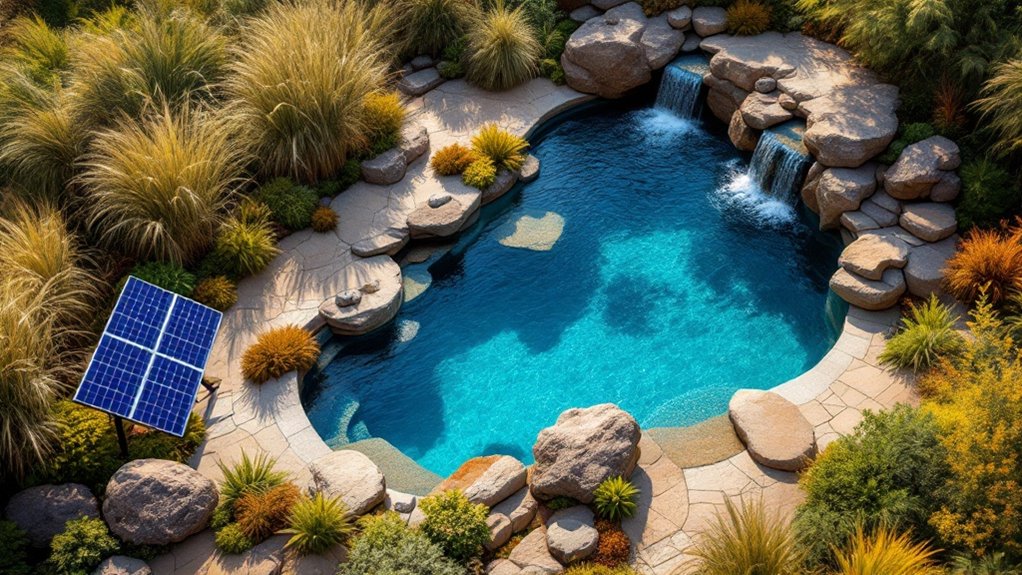Biodegradable cleaners offer a sustainable alternative for pool maintenance. These products utilize natural ingredients that decompose safely, reducing their ecological footprint. Unlike traditional cleaners, they avoid harsh chemicals that can harm aquatic life. As more pool owners seek environmentally friendly options, understanding the advantages of biodegradable cleaners becomes essential. What specific benefits do these cleaners provide for both pool maintenance and the surrounding ecosystem?
Understanding Biodegradable Cleaners
Although many pool owners often rely on traditional chemical cleaners, understanding biodegradable cleaners is essential for promoting a healthier environment. Biodegradable cleaners are formulated from natural ingredients that break down safely over time, minimizing their impact on ecosystems. Unlike conventional chemicals, these products do not contain harsh substances that can harm aquatic life or contaminate water sources. Common biodegradable options include plant-based enzymes and surfactants, which effectively remove dirt and debris while being gentle on the environment. Additionally, they often come in eco-friendly packaging, further reducing waste. By choosing biodegradable cleaners, pool owners can maintain a clean and safe swimming area while contributing to a sustainable approach to pool maintenance. This choice reflects a growing awareness of environmental responsibility among consumers.
The Environmental Impact of Traditional Pool Cleaning Products
Traditional pool cleaning products pose significant environmental risks due to their chemical composition. Many of these products contain harmful substances such as chlorine, phosphates, and synthetic surfactants, which can leach into surrounding soils and waterways. When released into the environment, these chemicals can disrupt aquatic ecosystems, leading to toxic conditions for fish and other wildlife. Additionally, the production and disposal of traditional cleaners contribute to air and water pollution, exacerbating climate change and environmental degradation. The runoff from treated pools can contaminate local water supplies, posing health risks to humans and animals alike. Overall, the widespread use of conventional pool cleaning agents raises serious concerns regarding their long-term ecological impact, highlighting the need for more sustainable alternatives.
How Biodegradable Cleaners Work
Biodegradable cleaners operate through the use of natural ingredients that break down effectively in the environment. This breakdown process considerably reduces their environmental impact compared to traditional cleaners, contributing to a healthier ecosystem. Additionally, these products are designed to be safe for aquatic life, ensuring that water quality remains intact.
Natural Ingredients Breakdown
Natural ingredients serve as the foundation for biodegradable cleaners, effectively breaking down contaminants without harming the environment. These cleaners typically utilize plant-based enzymes, surfactants, and organic acids that target and dismantle dirt, grime, and organic matter found in pools. Enzymes act as catalysts, accelerating the degradation process by breaking down larger molecules into smaller, more manageable components. Surfactants help to lift and disperse dirt, allowing it to be easily washed away. Organic acids, derived from natural sources, provide effective cleaning power while remaining safe for water systems. The synergistic effect of these ingredients guarantees that biodegradable cleaners maintain high performance levels, offering an efficient alternative to traditional chemicals while promoting sustainability in pool maintenance.
Environmental Impact Reduction
While many conventional cleaning products can introduce harmful chemicals into water ecosystems, biodegradable cleaners greatly reduce environmental impact by utilizing safe, non-toxic ingredients. These cleaners are formulated to break down naturally, ensuring that they do not persist in the environment. When used in pool maintenance, biodegradable cleaners minimize the risk of water contamination, allowing for a healthier ecosystem both in and around the pool. Additionally, they contribute to lower levels of chemical runoff, which can adversely affect local flora and fauna. By opting for biodegradable options, pool owners actively participate in sustainable practices that promote ecological balance. Overall, the shift to biodegradable cleaners represents a significant step towards enhancing environmental stewardship in pool care.
Safety for Aquatic Life
Cleaners designed with biodegradable properties offer a safer alternative for aquatic life by utilizing ingredients that break down harmlessly in the environment. Unlike traditional pool cleaners, which often contain harsh chemicals, biodegradable options use natural substances that minimize toxicity to fish and other aquatic organisms. These cleaners are formulated to degrade quickly, reducing the risk of long-term pollution in water bodies. When introduced into pools, they do not compromise water quality or harm surrounding ecosystems. By choosing biodegradable cleaners, pool owners contribute to the preservation of aquatic habitats, ensuring that wildlife remains unharmed. This eco-friendly approach promotes a healthier balance within aquatic ecosystems, safeguarding biodiversity while maintaining clean and enjoyable swimming environments.
Benefits of Biodegradable Cleaners for Pool Maintenance
Choosing biodegradable cleaners for pool maintenance offers a range of benefits that align with environmental sustainability and health considerations. These cleaners break down naturally, reducing pollution and minimizing harmful chemical runoff into surrounding ecosystems. By opting for biodegradable solutions, pool owners contribute to healthier aquatic environments, safeguarding marine life. Furthermore, these products are typically free from harsh toxins, making them safer for human health, particularly for children and pets who frequent pool areas. Their gentle formulation guarantees effective cleaning without compromising water quality or irritating skin. Additionally, biodegradable cleaners often enhance water clarity and improve overall pool hygiene, leading to a more enjoyable swimming experience. Ultimately, these benefits underscore the importance of sustainable practices in pool maintenance.
Comparing Biodegradable Cleaners to Conventional Options
When evaluating pool cleaning products, a notable distinction arises between biodegradable cleaners and their conventional counterparts. Biodegradable cleaners, derived from natural ingredients, decompose safely in the environment, minimizing ecological impact. In contrast, conventional options often contain harsh chemicals that can harm aquatic life and disrupt local ecosystems. Additionally, biodegradable cleaners typically feature non-toxic formulations, making them safer for swimmers and pets. Conventional cleaners, while sometimes effective, may leave harmful residues that linger in pools and surrounding areas. Cost comparisons reveal that biodegradable options can be competitively priced, especially when considering long-term environmental benefits. Ultimately, choosing between these two categories involves weighing ecological responsibility against the effectiveness of traditional cleaning methods.
Tips for Choosing the Right Biodegradable Cleaner
How can one guarantee they select the most effective biodegradable cleaner for their pool? First, examining the ingredients is essential; ideally, they should be plant-based and non-toxic. Next, seeking certifications from reputable organizations guarantees that the product meets environmental standards. Additionally, reading customer reviews can provide insights into the cleaner’s performance and effectiveness. It is also wise to take into account the cleaner’s suitability for specific pool materials, as some formulations may be harsher on certain surfaces. Testing a small area before full application can prevent potential damage. Finally, comparing products based on their environmental impact, such as packaging and overall sustainability, will help consumers make an informed choice that aligns with their eco-friendly goals.
Real-Life Success Stories: Eco-Friendly Pool Maintenance
Numerous pool owners have embraced eco-friendly practices, showcasing the effectiveness of innovative biodegradable cleaning solutions. Success stories highlight community pools that have undergone remarkable transformations by adopting sustainable maintenance techniques. These examples illustrate the positive impact of environmentally conscious choices in pool upkeep.
Innovative Cleaning Solutions
As the demand for eco-friendly practices grows, innovative cleaning solutions for pool maintenance have emerged, showcasing the effectiveness of biodegradable cleaners. Companies have developed advanced formulations that not only maintain water clarity but also protect aquatic life. One notable example is a biodegradable enzyme-based cleaner, which effectively breaks down organic debris without harsh chemicals. This product has gained popularity among pool owners seeking sustainable options. Additionally, some businesses have introduced solar-powered pool cleaning robots that utilize eco-friendly cleaning agents, reducing energy consumption and chemical exposure. These innovations demonstrate a commitment to sustainability while ensuring that pools remain clean and inviting. As environmental awareness increases, these cleaning solutions highlight a shift towards greener practices in pool maintenance.
Community Pool Transformations
What inspires communities to embrace eco-friendly pool maintenance? A growing awareness of environmental issues and a desire for healthier recreational spaces drive this transformation. In various neighborhoods, community pools have successfully adopted biodegradable cleaners, showcasing remarkable before-and-after results. One notable example is a public pool in a suburban area that switched to eco-friendly products, considerably reducing chemical runoff into local waterways. Residents reported clearer water and improved swimmer satisfaction. Another community transformed their pool area by incorporating natural filtration systems alongside biodegradable cleaning solutions, attracting families seeking greener alternatives. These success stories illustrate how commitment to sustainability not only enhances pool aesthetics but also fosters a sense of community pride and responsibility towards the environment, ultimately inspiring further eco-friendly initiatives.
Sustainable Maintenance Practices
Communities embracing biodegradable cleaners have set the stage for broader sustainable maintenance practices in pool care. One notable example is a neighborhood in California that shifted to eco-friendly cleaning methods, considerably reducing chemical runoff into local waterways. Pool owners reported improved water quality and healthier ecosystems surrounding their facilities. Additionally, a Texas community utilized solar-powered pumps in conjunction with biodegradable cleaning products, leading to a remarkable decrease in energy consumption and maintenance costs. These real-life success stories illustrate that adopting sustainable practices not only benefits the environment but also enhances the overall pool experience. As more communities adopt similar methods, the potential for widespread ecological impact increases, demonstrating the effectiveness of eco-friendly maintenance in the swimming pool industry.
Making the Switch: Transitioning to Biodegradable Cleaning Solutions
Shifting to biodegradable cleaning solutions for pools can greatly improve both environmental health and water quality. Changing involves evaluating existing cleaning products and understanding their chemical compositions. Pool owners should research biodegradable alternatives that effectively manage algae, bacteria, and debris without harming aquatic ecosystems. It’s crucial to gradually replace traditional cleaners, allowing time to assess the performance of new products. Engaging with suppliers who specialize in eco-friendly solutions can provide valuable insights and recommendations. Additionally, monitoring water chemistry during the change guarantees that the pool remains safe for swimmers. By making informed choices and embracing sustainable practices, pool owners contribute positively to environmental conservation while maintaining the cleanliness and safety of their pools.
Frequently Asked Questions
Are Biodegradable Cleaners Safe for All Pool Types?
The safety of biodegradable cleaners for various pool types depends on their formulation. Generally, most biodegradable cleaners are safe for all pool materials, but it’s advisable to verify compatibility with specific surfaces to avoid potential damage.
How Long Do Biodegradable Cleaners Take to Work?
The effectiveness of biodegradable cleaners varies, typically taking anywhere from several hours to a few days to show noticeable results. Factors such as water temperature, cleanliness level, and product formulation can influence the duration considerably.
Can I Mix Biodegradable Cleaners With Traditional Chemicals?
Mixing biodegradable cleaners with traditional chemicals is generally not recommended. The interaction may reduce effectiveness or create harmful reactions. It’s advisable to use one type of cleaner at a time to guarantee peak performance and safety.
Do Biodegradable Cleaners Have a Strong Odor?
Biodegradable cleaners generally possess milder odors compared to traditional chemicals. Their formulations often rely on natural ingredients, resulting in less overpowering scents, which can make them more pleasant to use in various cleaning applications.
Are Biodegradable Cleaners More Expensive Than Conventional Options?
The inquiry into biodegradable cleaners often reveals that they can be more expensive than conventional options. This price difference is attributed to the use of natural ingredients and sustainable production methods that prioritize environmental safety.
Conclusion
To sum up, biodegradable cleaners offer a sustainable alternative for pool maintenance, considerably reducing the environmental impact of traditional cleaning products. By harnessing the power of natural ingredients, these eco-friendly solutions not only promote healthier water quality but also protect aquatic ecosystems. As more pool owners recognize the benefits of switching to biodegradable options, the collective effort towards cleaner, greener swimming environments becomes increasingly achievable, ensuring a safer and more enjoyable experience for both swimmers and the planet.




